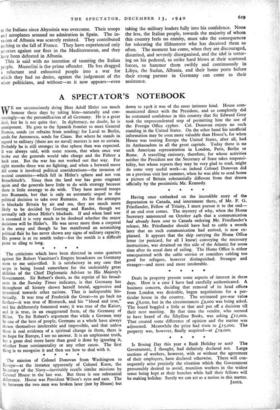A SPECTATOR'S NOTEBOOK
WE are unconsciously doing Herr Adolf Hitler too much honour these days by taking him—naturally and con- vincingly—as the personification of all Germany. He is a great deal, but he is not quite that. In diplomacy, no doubt, he is omnipotent. He goes to the Spanish frontier to meet General Franco, sends (or refrains from sending) for Laval to Berlin, sends for Antonescu, sends for Ciano. But where he stands in regard to military (there are no naval) matters is not so certain. Probably he is still stronger in that sphere than was expected. It was always said, with some reason, that when once war broke out the generals would take charge and the Fiihrer a back seat. But the war has not worked out that way. For eight months there was no fighting, and when a forward move did come it involved political considerations—the invasion of neutral countries—which fell in Hitler's sphere and not von Brauchitsch's. Since then the land war has gone stagnant again and the generals have little to do with strategy because there is little strategy to do with. They have moved troops into Rumania, but that is only an automatic sequel to the political decision to take over Rumania. As for the attempts to blockade Britain by air and sea, they are much more likely to be decided by Goering and Raeder, though we normally talk about Hitler's blockade. If and when land war is resumed it is very much to be doubted whether the major decisions will be Hitler's. He was never more than a corporal in the army and though he has manifested an astonishing political flair he has never shown any signs of military capacity. His power is at its zenith today—but the zenith is a difficult point to cling to long.
* *










































 Previous page
Previous page